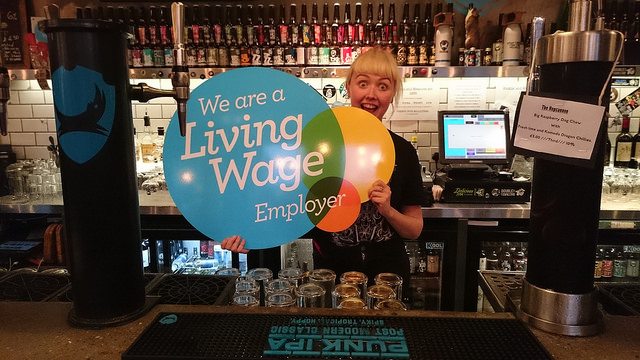How ‘punk’ brewery BrewDog became a trailblazer for fair pay
Last week global drinks giant Diageo became the 900th employer in Scotland to win Living Wage accreditation. As the Living Wage movement accelerates north of the border, we talk to one of the first firms to adopt the measure: ‘punk’ brewer BrewDog. BrewDog is known for many things: remarkable beer brands, radical publicity stunts, phenomenal business growth to name a few.
But the craft brewer has another string to its bow – as a trailblazer in the field of fair pay. BrewDog’s commitment to the real Living Wage may not be as headline-grabbing as packaging beer in roadkill, or having an AGM meeting that resembles a rock concert. But, just like its brews, BrewDog’s decision in 2014 to adopt the Living Wage was pioneering.
BrewDog has always had a focus on providing exceptional customer service, says Fiona Hunter, Head of People at BrewDog. “Low pay, particularly in the hospitality sector, is something that doesn’t sit well with us. At BrewDog, paying a good wage makes absolute business sense. We cannot expect our employees to come to work and be amazing when they are worried about making ends meet. Providing a good standard of living is the right thing to do, and it has the added benefit of helping our employees be as brilliant as possible, which drives the growth of the business. The decision to pay the Living Wage was made as part of a conscious decision to do the right thing for our employees. It was all about better rewarding and engaging our staff.”
Introducing the real Living Wage and gaining official accreditation for it took around three months, and meant that the company took a close look at its other employee conditions. The company’s pay structures were revised and simplified to give more pay transparency as well as uplifts for those in managerial positions. Zero hour contracts were abolished and a new system of guaranteed hours was introduced.
Says Hunter: “Happy, engaged staff need to know how many hours they’ll be working each week. We don’t want our employees to not know how much they might earn from week to week. Management feedback tells us that having a stable team with guaranteed hours for each employee makes sense operationally too. Also, we invest massively in training and developing our staff and zero hours contracts diminish the impact of that.”
“Low pay, particularly in the hospitality sector, is something that doesn’t sit well with us. At BrewDog, paying a good wage makes absolute business sense…”
Chris Queen, general manager of the company’s DogHouse bar in Merchant City, Glasgow has worked for 20 years in hospitality and is celebrating one year with BrewDog. He sees the benefits of both working for a Living Wage accredited firm, and running a Living Wage accredited business within that. “BrewDog is hands down the best employer I’ve worked with,” he says. “Staff turnover is much lower compared to other hospitality companies. My staff feel valued and they are much more engaged. I think if you treat people with respect you get respect back.”
Survey findings released earlier this year by The Poverty Alliance, which promotes the real Living Wage in Scotland, back this up. The survey by Survation found that seven out of ten would be more committed to their job if they worked for an accredited Living Wage organisation, and 66% would feel more valued at work if they were paid a Living Wage.
“My staff feel valued and they are much more engaged. I think if you treat people with respect you get respect back.”
The real Living Wage has the thumbs-up from the Scottish public too. In survey findings released this week by The Poverty Alliance, three out of four Scots said they would think more positively of a company which became Living Wage accredited. Four out of ten people surveyed said they cared if products and services they buy are from a Living Wage employer. And 70% of respondents said that being paid a Living Wage would make them feel their employer was investing in their development.
Paying someone on a minimum wage a Living Wage equates to a pay rise of £2000 a year, according to The Poverty Alliance. Director Peter Kelly said: “More and more employers in Scotland are seeing the benefits of paying a real Living Wage, in terms of increased retention and better staff morale. That’s why the sign-up rate in Scotland has been faster than in any other region in the U.K.
Kelly added: “Our research and BrewDog’s experience show that there is a definite boost in reputation, with 75% of those surveyed saying they would think more highly of an employer who was Living Wage accredited and high percentages saying they would be better employees as a result.”
The last word goes to BrewDog and Fiona Hunter, who advises employers: “Allow yourself plenty of time. Don’t just look at how it’s going to affect you for the first year; look five years into the future. Combine it with an overall look at how you’re treating your staff. It can’t be a band aid, if you’ve got deeper staff engagement problems or deeper dissatisfaction issues it’s highly likely that you’ve got other things going on as well. The impact of doing something will be lessened if you don’t. Fix those at the same time.”


Leave A Comment
You must be logged in to post a comment.